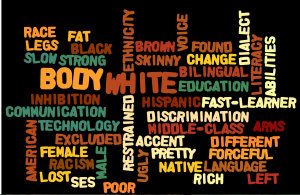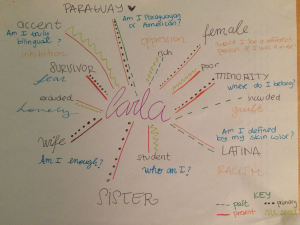To answer the first four questions I created this wordle:

This is my own identity map:

I always struggle when asked to describe or write down who I am or what I identify as. This has been true from a very young age. Born in Paraguay to an American mother and Paraguayan father I always struggled to define who I am. In Paraguay I am not considered Paraguayan, I speak with accent that is obvious to everyone. In the USA, I am also considered a foreigner and people are surprised to find out I am an American citizen. Am I bilingual? According to the literature I might not be given that I speak English with an accent. It troubles me that my proficiency is measured as a comparison to a standard American English, when in reality there is a large variation of accents even within the US. I don’t want to perceived as having a ‘cute’ accent, I want to be an equal. So, what am I and where to do I belong? I know I am a good friend daughter and sister, but in terms of other more abstract identities I don’t know. Do I have to know?
This assignment made me realize that I don’t have to fit into a single category. In fact, doing so would undermine the constant balancing act of being privileged and underprivileged all in one day. For example, I have been lucky in that my family could afford to put me through School in the US, I consider myself privileged in that regard. In the US, I am considered a minority and underprivileged based on the fact that I am a Latina woman in the sciences. In Paraguay I am privileged and thought of as belonging to high SES. Ironically, I live in a subsidized apartment with my husband here in State College. In the States I am judged based on who I am and not my family’s history, mainly because my family is still back at home. I never understood whether this is something I like or not. I like being my own person, yet it would be nice for people to know where I come from.
This dichotomy in terms of all the privileges I enjoy in Paraguay and the challenges I face in the US has always puzzled me. I can be in State College deemed as a foreigner, and always struggling to prove my worth in terms of academic achievement in my program. I struggle with the thought that maybe I made it to PSU solely as a token, to fill a minority quota. I constantly feel like an outsider and know that other people also know that I don’t belong. This was particularly obvious when some people made remarks that I found extremely offensive. I got the courage to say something but was scorned because I just ‘didn’t understand’ that they were just joking. Since then, I have never been invited to outings or group studying. I spoke up and was left out immediately. There are days when I wonder why I couldn’t just stay quiet and let it go, but most days I am confident that I did the right thing.
There are nights when I sit and cry because I think that I am not smart enough, pretty or skinny enough, proficient enough. Sometimes, I feel that I am simply not enough of anything. My English is not good enough, so how could I possibly make in academia? I am not smart enough so how will I ever complete my degree? These recurrent thoughts plague my mind and sometimes paralyze me. This class and particularly this assignment have me realize that I don’t need to compare myself to anyone or anything. I am different, but so is everyone. All these categories are in place, but all they do is separate people based on their identities. What is interesting is that these categories carry different consequences based on where I am (Paraguay or the US).
Another thing that made me think a lot, was the fact that I identify myself as a wife. One of my friends made me promise her that I would not be defined by my husband once I got married. During this assignment the category wife was one of the first ones to come to mind. Am I defined by that term? Maybe not, but it definitely shapes who I am.
Other aspects of what I identify as or who I am puzzled me a little. Certain ones like survivor, which should be positive one, always comes with a sense of guilt and shame. This goes to show that all identities come with a sense of belonging and a particular cost. Identities are in constant flow and might change over time as I look at my map. Who I am today may or may not be who I will become tomorrow, but it will definitely provide a blueprint for the future.


